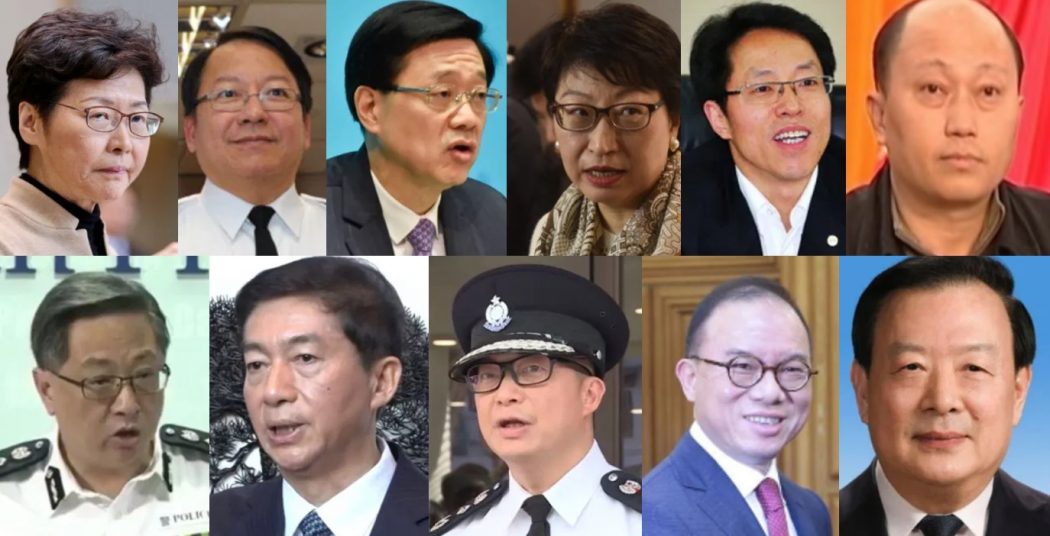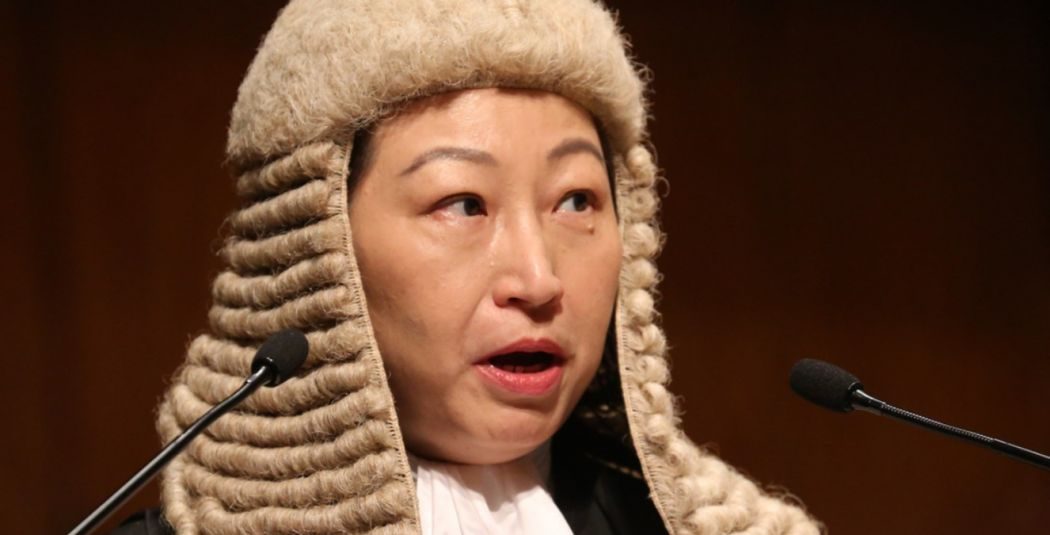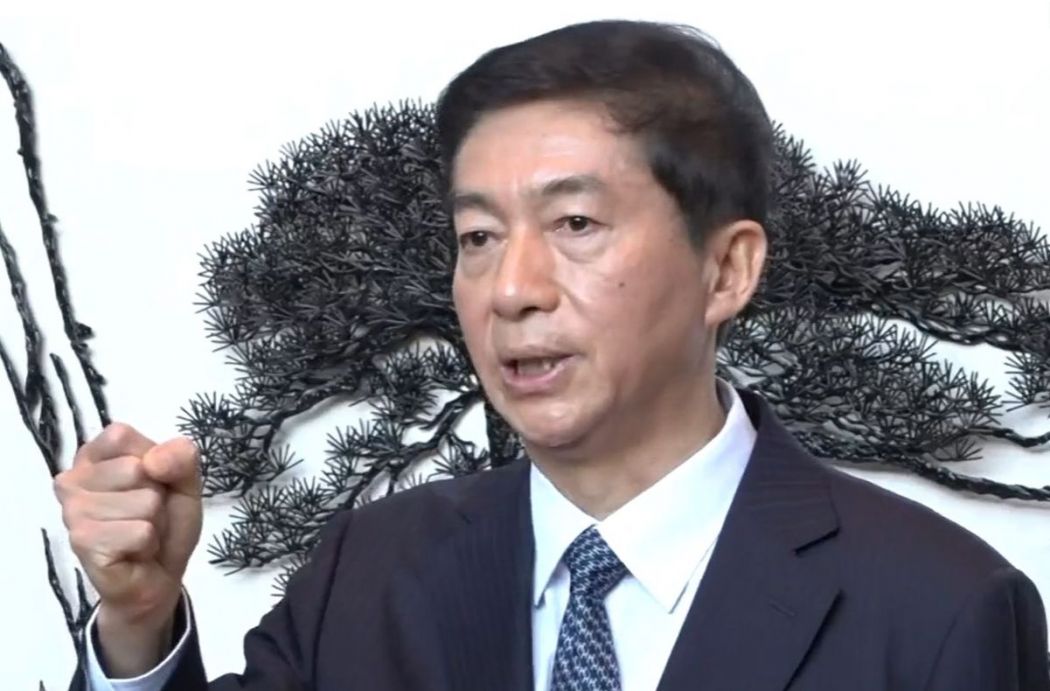Last Friday, the US Treasury Department announced that 11 individuals from Hong Kong and mainland China – including the city’s Chief Executive Carrie Lam – would be sanctioned for the alleged roles they played in undermining Hong Kong’s autonomy.
Any property or assets which the 11 possess in the US are now frozen, and US citizens or others based in the country are banned from doing business with them. Those on the sanctions list were quick to dismiss the impact of the move, with many pointing out that they had no assets at all in the US.

HKFP examines why each official was targeted, how they reacted, and how they may be affected.
Chief Executive Carrie Lam

Just a week before the announcement, Hong Kong’s Chief Executive sneered at the idea of being sanctioned, saying that she had no assets in the US and had no particular desire to go there. Lam struck a similarly dismissive tone in a Facebook post the day after sanctions were announced, declaring that she would cancel her existing US visitor visa of her own accord.
However, the sanctions could hit the Lam family more than the Chief Executive cares to admit publicly. Her second son, Joshua Lam, is a graduate student of mathematics at Harvard University, and was scheduled to enter the job market in the autumn. His future in the US is now uncertain, following President Trump’s executive order in July suspending the entry of sanctioned individuals and immediate family members. On August 9, investigative news agency Factwire reported that Joshua Lam had been out of contact with his US landlords and his roommate for almost two weeks, amid suggestions of a family emergency.
US Treasury statement on Carrie Lam – Click to view
Lam is the chief executive directly responsible for implementing Beijing’s policies. Last year she pushed for a new law which would have allowed extradition of suspects to the mainland, sparking a series of massive opposition protests in Hong Kong which has its own separate legal system. Lam is sanctioned for her involvement in developing, adopting, or implementing the Law of the People’s Republic of China on Safeguarding National Security in the Hong Kong Special Administrative Region (National Security Law).
Secretary for Justice Teresa Cheng

The day after the sanctions were announced, Hong Kong’s Justice Secretary called the US move desperate and unlawful, adding that her personal interests were not in the least important compared to those of China and its people. The mention of personal interests was triggered by reporters’ questions about Cheng’s husband’s role as chairman of building services firm Analogue Holdings Ltd, which has business interests in the US. Analogue Holdings was quick to advise its shareholders that Cheng does not have “any legal or beneficial ownership or financial interests” in any of the company’s shares, and the preliminary assessment of legal counsel in the US was that the sanctions did not apply to the company.
Nevertheless, two days afterwards, Analogue Holdings issued another notice to shareholders, advising that it had sold 2 per cent of its shares in New York-based joint venture Transel Elevator & Electric Inc., reducing its stake from 51 per cent to 49 per cent. Cheng’s husband, Otto Poon, wrote that the sale was on legal advice due to the “latest changing Sino-US tension.”
US Treasury statement on Teresa Cheng – Click to view
As head of Hong Kong’s justice department, Cheng has said that her major responsibility is implementing and safeguarding national security in the city. She is designated for being responsible or involved in developing, adopting, or implementing the National Security Law.
Director of the HK Liaison Office Luo Huining

The Liaison Office director reacted with derision to news that he had been sanctioned, saying that he did not have a single penny’s worth of assets abroad. Luo mockingly offered to send Donald Trump US$100 so the US President could freeze it. Luo was appointed to lead the Liaison Office in January this year following a reshuffle, and was later also appointed as National Security Adviser, a new post created under the national security law. Luo said that being placed on the sanctions list shows that “I have done what I should for Hong Kong and my country as a whole.”
US Treasury statement on Luo Huining – Click to view
Luo Huining is mainland China’s top official in Hong Kong, and his office has claimed it is entitled to intervene in the affairs of the semi-autonomous city despite the Basic Law’s ban on such interference. Luo is also a National Security Adviser to the Committee for Safeguarding National Security in Hong Kong. He is designated for being a leader or official of a government entity that has engaged in, or whose members have engaged in, actions or policies that threaten the peace, security, stability, or autonomy of Hong Kong.
Secretary for Security John Lee Ka-chiu

Lee accused the US of double standards and hypocrisy, given the number of its own laws designed to protect its national security. He added that the US attempt at intimidation through “so-called sanctions” would not succeed.
US Treasury statement on John Lee Ka-chiu – Click to view
As Hong Kong’s Secretary for Security, Lee is responsible for all security-related policies. He is also a member of Lam’s Executive Council, or cabinet, and has introduced a new police unit dedicated to enforcing the national security law. He is designated for being involved in coercing, arresting, detaining, or imprisoning individuals under the authority of the National Security Law, as well as being involved in its development, adoption, or implementation.
Hong Kong Police Force Commissioner Chris Tang

Hong Kong’s police chief said the sanctions were “meaningless” to him, adding that safeguarding national security and the security of Hong Kong was his responsibility and his honour.
US Treasury statement on Chris Tang – Click to view
Chris Tang, who took over as police commissioner last November, has enthusiastically supported the new law. Under his leadership the police besieged Hong Kong Polytechnic and arrested hundreds of protesters. Tang is also a member of the newly established Committee for Safeguarding National Security. He is designated for coercing, arresting, detaining, or imprisoning individuals under the authority of the National Security Law.
Former Police Commissioner Stephen Lo

Tang’s predecessor, who was police chief from May 2015 until November 2019, said the US sanctions were “completely unreasonable and unjust,” adding that he felt extremely regretful and resentful. Lo said safeguarding national security was the responsibility of the police, and he would continue to resolutely support the Chinese central government and the Hong Kong government in implementing the national security law.
US Treasury statement on Stephen Lo – Click to view
Under Lo’s leadership more than 4,000 protesters were arrested and 1,600 injured in a succession of clashes. He is designated as a leader or official of a government entity whose members have engaged in activities to prohibit, limit, or penalize the exercise of freedom of expression or assembly in Hong Kong.
Secretary for Constitutional and Mainland Affairs Erick Tsang

Tsang, who was appointed Secretary for Constitutional and Mainland Affairs in April, said the “so-called sanctions” were simply self-deception, had no effect and were meaningless. He added mockingly: “If you want to sanction, then please find something that affects me.”
US Treasury statement on Erick Tsang – Click to view
Tsang’s office oversees relations between the Hong Kong and mainland governments. He is designated for being responsible for or involved in developing, adopting, or implementing the National Security Law.
Secretary General, Committee for Safeguarding National Security of the HKSAR, Eric Chan

Asked whether his inclusion on the sanctions list led him to regret his role as director of the Chief Executive’s office, Eric Chan insisted that he had no regrets.
US Treasury statement on Eric Chan – Click to view
Chan was also appointed by Beijing to be Secretary General of the Committee for Safeguarding National Security, established under the national security law. Its work is not made public and its decisions are not subject to judicial review. He is designated for being responsible for or involved in developing, adopting, or implementing the National Security Law.
Xia Baolong and Zhang Xiaoming of the Hong Kong and Macau Affairs Office of the State Council, and Director of the Office for Safeguarding National Security Zheng Yanxiong

The Hong Kong and Macau Affairs Office, of which Xia and Zhang are director and deputy director respectively, issued a statement condemning the sanctions, saying intimidation or threats would not affect its determination to safeguard national security. The Office accused the US of “blatantly hegemonic behaviour” and of trampling on international law and the basic norms governing international relations. The newly-established Office for Safeguarding National Security in Hong Kong, which Zheng Yanxiong leads, did not issue a statement in response to the sanctions.
US Treasury statement on Xia Baolong – Click to view
Xia Baolong was named in February as Director of the Hong Kong and Macau Affairs Office, an organization within China’s State Council or cabinet. The Office has stated that it is entitled to supervise affairs in Hong Kong, including implementation of the city’s Basic Law. He is designated for being a leader or official of a government entity that has engaged in, or whose members have engaged in, actions or policies that threaten the peace, security, stability, or autonomy of Hong Kong.
US Treasury statement on Zhang Xiaoming – Click to view
Zhang Xiaoming is former Director and current Deputy Director of the Hong Kong and Macau Affairs Office, in charge of daily operations. As director, he backed Lam’s controversial 2019 Hong Kong extradition bill which triggered the mass protests. He is designated for being a leader or official of a government entity that has engaged in, or whose members have engaged in, actions or policies that threaten the peace, security, stability, or autonomy of Hong Kong.
US Treasury statement on Zheng Yanxiong – Click to view
Zheng Yanxiong is the inaugural director of the newly created Office for Safeguarding National Security in Hong Kong. It was established under the national security law and has broad powers to supervise local authorities and directly investigate major cases. Zheng is designated for being a leader or official of a government entity that has engaged in, or whose members have engaged in, actions or policies that threaten the peace, security, stability, or autonomy of Hong Kong.
Support HKFP | Policies & Ethics | Error/typo? | Contact Us | Newsletter | Transparency & Annual Report | Apps
Help safeguard press freedom & keep HKFP free for all readers by supporting our team
























